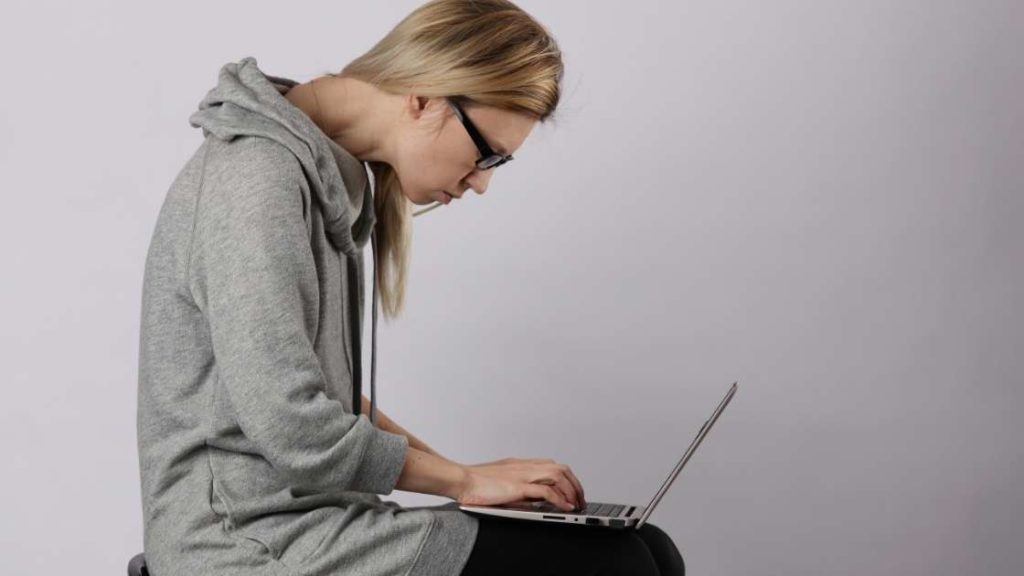How to Start Making Small Adjustments to Your Posture

As a massage therapist, one of the most common questions I’m asked is, “Why do my shoulders make a crunchy noise whenever you touch them?” After I explain that “crunches” are the sounds of muscle adhesions breaking up, I’m then asked, “Why do I have muscle adhesions in my shoulders?” Close to 100% of the time, my response to this is, “Forward head posture.”
Let’s face it, almost nobody has perfect posture. We hunch at desks, we slouch on couches, and we use poor body mechanics when we do stuff that isn’t sitting. When we do these types of things, the neck and shoulder muscles overstretch and begin to stiffen. When the pain starts, the pecs and back muscles compensate for the weakness in the neck and shoulders. This overworking will then cause pec and back pain, and so on and so forth until your entire body is tight and sore. Imperfect posture is a trip, isn’t it?
But it is possible to improve your posture! It takes some effort, but it can be done! And how is that?
Ways to Make Small Adjustments to Your Posture
Shoulders back, stand up tall… yeah, yeah, yeah. That’s stuff we’re told to do but will probably forget to do. Being mindful of posture is the first step, and good on you if you can stand up tall and hold your shoulders back without being constantly reminded! In the event that you unconsciously slouch no matter how often you’re told what to do, here’s some tips!
Do Yoga
It improves your balance, flexibility, and strength. All things that play a crucial role in good posture!
Exercise
Stronger muscles can better support your spine. Not to mention, they’ll better support every other part of your body too!
Adjust Your Desk
Have you ever heard of a foot hammock? I’m sure most people haven’t. It’s a hammock that ties around the edges of your table, giving your feet a supportive sling to rest on. When you’re more comfortable and supported, you’re less likely to hunch.
If you don’t feel like buying a hammock, you can also put a box or a step stool under your desk. When you plant your feet on it, your spine will stay more upright.
You can always get a standing desk too!
Align Your Back with the Driver’s Seat
The way you drive has quite an impact on your posture. Make sure your seat is upright, no matter how cool it looks in the reclined position.
For some extra support, consider placing a pillow on the inward curve of your lower spine. A rolled-up towel or scarf can work too!
Know Your Sleeping Position
Back sleeper, stomach sleeper, side sleeper, a combination of everything sleeper? Know which one you are and make sure you’re sleeping on the right pillow! How do you know which pillow is best?
Also, don’t settle for an uncomfortable mattress. Your spine can’t stay properly aligned on an uneven surface. And the muscle aches from poor sleep won’t help your posture either.
Avoid High Heels
Or at least set them aside for special occasions, if you can. After a time, prolonged use will alter the natural shape of the feet and possibly affect your gait. An uneven gait is a sure contributor to poor posture.
Really, just don’t wear any type of uncomfortable shoe. Aching feet will knock your posture no matter which shoe started it.
Stop Looking Down at the Phone
Yeah, easier said than done. But really, try holding your phone the same way you would to take a selfie from a natural angle. All the head-hanging is killing your neck and ruining your posture!
Like this!
Get Bodywork
- Chiropractic Care – A good adjustment to the joints will make your body more moveable and less tense. The improved mobility will ease you right into better posture!
- Massage – When your muscles relax, your body can relax into a more upright position. Bring those muscles back into balance!
Now you know what to do! Stay happy, healthy, and upright!
Katrina Jenkins
Author, Licensed Massage Therapist
Katrina Jenkins graduated from Towson University in 2013 with a Bachelor’s Degree in Health Science and worked as a nurse’s aide briefly before pursuing her true passion. She graduated from the Massage Therapy Institute of Colorado in April 2016 with honors and completed the Touch of Healers Scholarship Program the following summer. She has been a part of the Moyer Total Wellness Team since the summer of 2017.
Resources
Correct Sitting Posture: Driving. https://www.physiomed.co.uk/uploads/guide/file/21/Physiomed_Sitting_Guide_-_Driving_Digital.pdf
Fathollahnejad, Kiana, et al. “The Effect of Manual Therapy and Stabilizing Exercises on Forward Head and Rounded Shoulder Postures: A Six-Week Intervention with a One-Month Follow-up Study.” BMC Musculoskeletal Disorders, vol. 20, no. 1, 18 Feb. 2019, bmcmusculoskeletdisord.biomedcentral.com/articles/10.1186/s12891-019-2438-y, 10.1186/s12891-019-2438-y. Accessed 3 May 2019.
Kim, DeokJu, et al. “Effect of an Exercise Program for Posture Correction on Musculoskeletal Pain.” Journal of Physical Therapy Science, vol. 27, no. 6, 2015, pp. 1791–1794, www.ncbi.nlm.nih.gov/pmc/articles/PMC4499985/, 10.1589/jpts.27.1791.
Photo Credit
Canva – ChesiireCat
Canva – Leung Cho Pan
